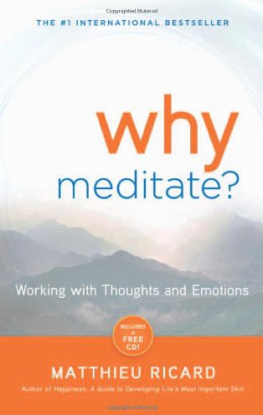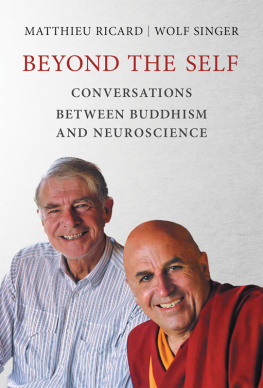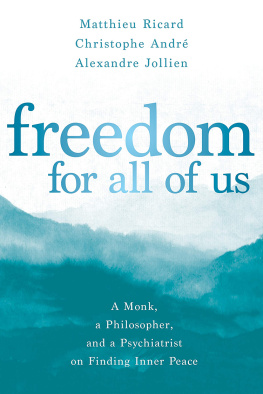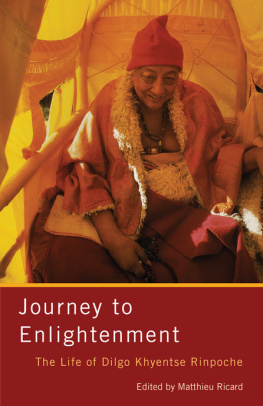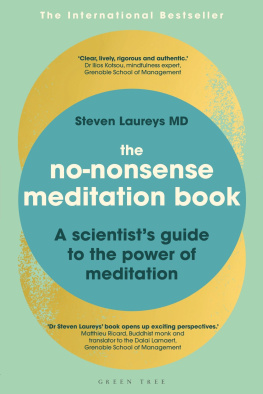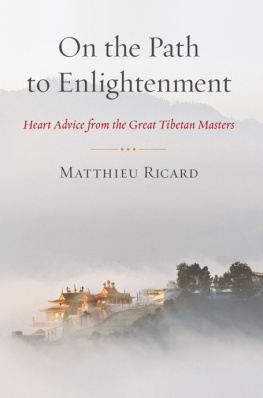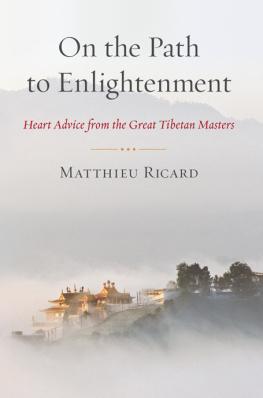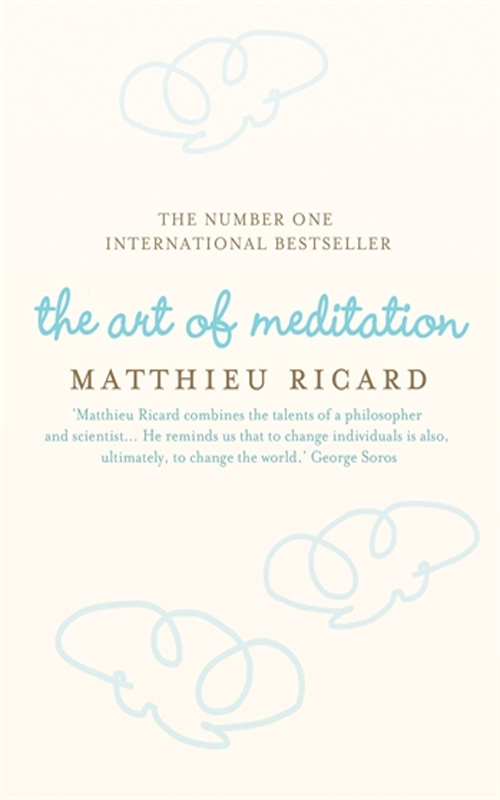First published in France as Lart de la meditation in 2008 by NiL ditions, Paris.
First published in English in Great Britain in 2010 by Atlantic Books, an imprint of Grove Atlantic Ltd.
Copyright Matthieu Ricard, 2008
Translation Sherab Chdzin Kohn, 2010
The moral right of Matthieu Ricard to be identified as the author of this work has been asserted by him in accordance with the Copyright, Designs and Patents Acts of 1988.
The moral right of Sherab Chdzin Kohn to be identified as the translator of this book has been asserted by him in accordance with the Copyright, Designs and Patents Acts of 1988.
All rights reserved. No part of this publication may be reproduced, stored in a retrieval system, or transmitted in any form or by any means, electronic, mechanical, photocopying, recording, or otherwise, without the prior permission of both the copyright owner and the above publisher of this book.
Every effort has been made to trace or contact all copyright holders. The publishers will be pleased to make good any omissions or rectify any mistakes brought to their attention at the earliest opportunity.
Atlantic Books
An imprint of Grove Atlantic Ltd
Ormond House
2627 Boswell Street
London
WC1N 3JZ
www.atlantic-books.co.uk
First eBook Edition: January 2010
ISBN: 978-1-848-87482-4
We must be the change we want to see in the world.
Gandhi
WHY THIS LITTLE BOOK ON MEDITATION? FOR FORTY years I have had the good fortune to study with authentic spiritual masters who inspired me and illuminated my path in life. Their precious instructions have guided my actions. I am not a teacher I remain more than ever a student but in the course of my travels round the world, I have frequently met people who have shared with me their wish to learn to meditate. I have tried to the best of my ability to direct them to qualified teachers, but this has not always been possible. So it is for all those people who have a sincere desire to meditate that I have collected these instructions, drawn from authentic Buddhist sources, into book form.
The real significance of meditation is inner transformation through training the mind, which is a really exciting adventure. The exercises you will find here are taken from a tradition that is more than two thousand years old. It is best to explore them gradually, but you may also practise them independently of each other, whether you devote only thirty minutes a day to meditation or practise it more intensively in the undisturbed environment of a retreat.
As to my personal history, I had the tremendous good fortune of meeting my spiritual master, Kangyur Rinpoche, in 1967 near Darjeeling in India. I owe him whatever goodness there is in my life. After his death in 1975, I spent several years in retreat in a small wooden hut built on stilts in the forest above his monastery. For a period of thirteen years, starting in 1981, I had the privilege of living in the presence of the great master Dilgo Khyentse Rinpoche and receiving his teachings. Since 1991 when he departed this world, I have often stayed in retreat in a small mountain hermitage in Nepal, a few hours away from Kathmandu, in a contemplative centre founded by the Shechen Monastery, where I usually reside. These periods of retreat have without a doubt been among the most fertile times of my life.
Over the course of the last ten years, I have also participated in several scientific research programmes intended to document the long-term effects of meditation practice on the brain and on behaviour. This research has shown that it is possible to make significant progress in developing qualities such as attention, emotional balance, altruism and inner peace. Other studies have also demonstrated the benefits of meditating for twenty minutes a day for a period of six to eight weeks. These benefits include a decrease in anxiety, in vulnerability to pain and in the tendency towards depression and anger, as well as strengthening attention, the immune system and an increase in general well-being. Thus no matter what point of view you approach it from from that of personal transformation, the development of altruistic love or physical health meditation emerges as a factor essential for leading a balanced life, rich in meaning.
It is a pity to underestimate the capacity we have to transform our mind. Each of us possesses the potential needed to free ourselves from the mental states that perpetuate our own suffering and that of others the potential to find our own inner peace and contribute to the welfare of others.
TAKE A SINCERE LOOK AT YOURSELF. WHERE ARE YOU in your life? What have your priorities been up till now and what do you intend doing with the time you have left?
We are a mixture of light and shadow, of good qualities and faults. Are we really the best we can be? Must we remain as we are now? If not, what can we do to improve ourselves? These are questions worth asking, particularly if we have come to the conclusion that change is both desirable and possible.
In the West, we are consumed from morning till night by endless activity. We do not have much time or energy left over to consider the basic causes of our happiness or suffering. We imagine, more or less consciously, that if we undertake more activities we will have more intense experiences and, therefore, our sense of dissatisfaction will fade away. But the truth is that many of us continue to feel let down and frustrated by our contemporary lifestyle.
The aim of meditation is to transform the mind. It does not have to be associated with any particular religion. Every one of us has a mind and every one of us can work on it.
Is Change Desirable?
There are very few people who would say that there is nothing worth improving in the way they live and experience the world. However, some people think their own particular weaknesses and conflicting emotions are something rich that contributes to the fullness of their lives. They believe this particular alchemy in their character is what makes them unique and think they should learn to accept themselves the way they are. They do not realize that this kind of thinking can lead to a life of chronic discontent. Nor do they realize that they could help themselves with just a little reflection and effort.
Imagine someone suggested you spend an entire day tormented by jealousy. Would you want to do that? I doubt it. If, on the other hand, someone suggested you spend that same day with your heart filled with love for all beings, you would probably be quite willing to do so. Im sure you would find that infinitely preferable to a whole day of jealousy.
As things stand now, no matter what our preferences might be, our mind is often filled with troubles. We spend a great deal of time consumed by painful thoughts, plagued by anxiety or anger, licking the wounds we receive from other peoples harsh words. When we experience these kinds of difficult moments, we wish we could manage our emotions; we wish we could master our mind to the point where we could be free of these afflicting emotions. It would be such a relief. However, since we dont know how to achieve this kind of control, we take the point of view that, after all, this way of living is normal or natural, and that it is human nature. Even if it were natural, that would not make it desirable. Illness, for example, comes to everybody, but does this prevent us from consulting a doctor?
We dont want to suffer. Nobody wakes up in the morning and thinks: Oh, if I could only suffer all day today and, if possible, every day for the rest of my life! Whatever we are occupied with an important task, routine work, walking in the woods, pursuing a relationship, drinking a cup of tea we always hope we will get some benefit or satisfaction out of it, either for ourselves or others. If we thought nothing would come of our activities but suffering, we wouldnt do anything at all and we would fall into despair.


